新概念英语第一册第73课
新概念英语单词第一册第73课:到国王街的走法
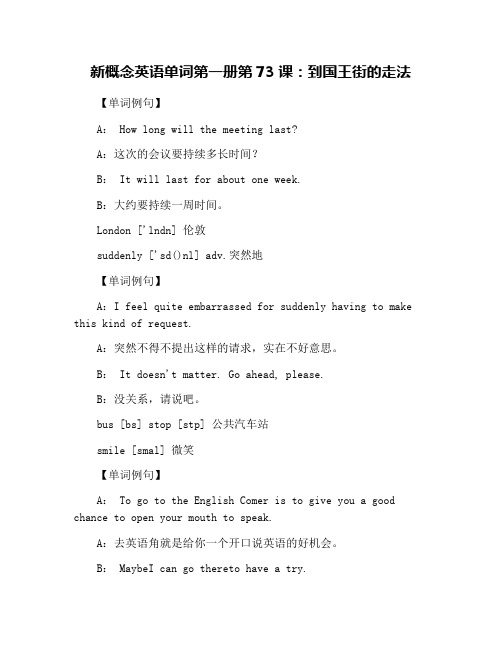
新概念英语单词第一册第73课:到国王街的走法【单词例句】A: How long will the meeting last?A:这次的会议要持续多长时间?B: It will last for about one week.B:大约要持续一周时间。
London ['lndn] 伦敦suddenly ['sd()nl] adv.突然地【单词例句】A:I feel quite embarrassed for suddenly having to make this kind of request.A:突然不得不提出这样的请求,实在不好意思。
B: It doesn't matter. Go ahead, please.B:没关系,请说吧。
bus [bs] stop [stp] 公共汽车站smile [smal] 微笑【单词例句】A: To go to the English Comer is to give you a good chance to open your mouth to speak.A:去英语角就是给你一个开口说英语的好机会。
B: MaybeI can go thereto have a try.B:也许我能够去那儿试一试。
hand [hnd] 手【派生词】handkerchief手帕【单词扩充】arm手臂【单词搭配】hand in hand手牵于 hands up举手 give a hand 协助【单词例句】A: Hold the steering wheel with your hands at teno'clock and two o'clock.A.把手握在方向盘的10点及2点钟方向。
B: And what shallI do then?B:我接着该这么做?pleasantly ['plezntli]adv 愉快地understand ['plezntli]懂,明白【派生词】understanding理解 nusunderstand误解【单词搭配】understand each other互相了解【单词例句】A: We have to be fair about these thingsA:对这种事情,我们一视同仁。
新概念英语第一册第73课

15. ------Did she speak to you? -------Yes , she __s_a_id_ (say)' Hello’.
29
知识回顾 Knowledge Review
understood [ˌʌndə'stʊ:d]
speak [spi:k] v.讲,说 spoke [spəʊk]
hand [hæ nd] n.手
pocket ['pɒkɪt] n.衣袋
phrase [freɪz] n. 短语 phrasebook 短语手册
slowly [ˈsləʊli] adv.缓慢地
4. ask sb sth 向某人问某事
She said to herself. 她自言自语道. say to oneself 自言自语 反身代词: myself, ourselves, herself, himself,
itself, themselves, yourself, yourselves
hurriedly adv.匆忙地 cut v. 切 thirstily adv.口渴地 go - went v. 走 greet v. 打招呼
5
形容词用来修饰名词或代词, 表示人或事物 的性质, 状态,和特征。
副词是一种用来修饰动词,形容词,副词或 句子,说明时间,地点,程度,方式等概念。
17
6. put-put-put,take-took-taken 把…放进去 put… into… 把…取出 take out… 他把书放进了书包。 He put the books into his schoolbag. 他拿出了一串钥匙。 He took out a set of keys.
新概念英语73课讲义

Lesson 73 the way to King Street一、单词与短语week: n. 周;weekend:周末;London: n.伦敦;in London:在伦敦;Suddenly:adv.突然地;补充:all of a sudden=suddenly:突然地;bus stop:公共汽车站;补充:railway station:火车站;airport:飞机场;smile: v.微笑;wear smile:面带微笑;pleasantly:adv.愉快地;补充:have a pleasant time:玩得高兴;understand:v.懂,明白;补充:make oneself understood: 让别人了解自己;Speak:v.讲,说;speak后边常跟具体的语言,如说汉语:speak Chinese;说英语:speak English;hand: n.手;补充:raise your hand:举手;wave your hand:挥手;pocket:n.衣袋;phrase:n.短语;slowly: adv.缓慢地;二、短语、句型及语法1、She does not know London very well, and she lost her way.他对伦敦不很熟悉,因此迷了路;在本句中有两个知识点需要引起注意:①know、、、well:对、、、了解,例:I know him very well.我非常了解他;I do not know the book very well.我对这本书不是很了解。
②关于与way相关的几个重要短语:lose one′s way: 迷路;I lost my way yesterday:昨天我迷路了;on the way to、、、在去、、、的路上;例:Tom is on the way to school now.汤姆现在正在去学校的路上。
by the way:顺便提一下,顺便问一下,例:By the way, I have something to tell you.我顺便有些事情想告诉你。
新概念第一册Lesson 73-74课

.God helps those who help themselves. 天助自助者。
How to ask the way:
• Can you tell me the way to ……? • How can I get to ……? • Where is ……?
10. ________ (be) your mother a sales assistant last year? No. she __________.
Read and change 1. Emma made the tea half a hour ago.
When did Emma make the tea? 2. The man under the tree lost his way to his hotel.
Come upstairs and see it. • 这里的and指的是“目的”
• 3.ask sb. sth. 问某人某事。 • eg:He asked the teacher a question. • ask sb for sth向某人要某物 • ask for it=ask for trouble自找麻烦
It is pleasant today. 给人好感的人
a pleasant person
She smiled a pleasant smile.
=She smiled pleasantly.
★understand (understood) ① v. 理解;懂 我不明白你的意思
v. 懂,明白
I don’t understand what you mean.
Who lost the way to the hotel? 3. Susan didn’t answer the call last night because she doesn’t like the awful guy.
新概念英语第一册课文默写 Lesson 73-143 word版-语法提示-高清打印
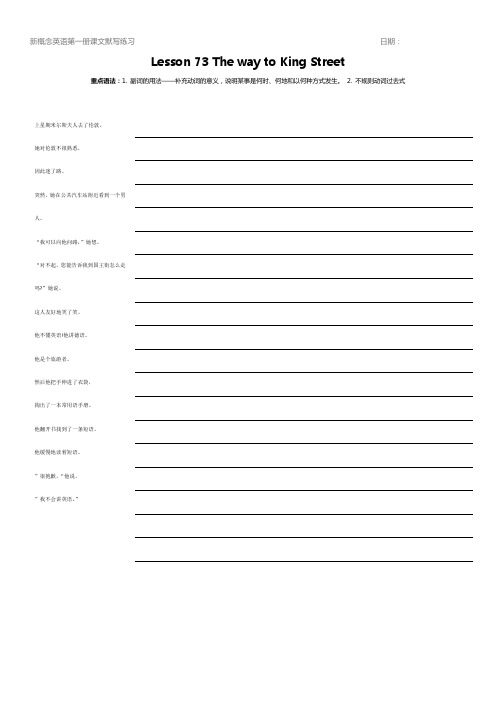
Lesson 73 The way to King Street重点语法:1. 副词的用法——补充动词的意义,说明某事是何时、何地和以何种方式发生。
2. 不规则动词过去式上星期米尔斯夫人去了伦敦。
她对伦敦不很熟悉,因此迷了路。
突然,她在公共汽车站附近看到一个男人。
“我可以向他问路,”她想。
“对不起,您能告诉我到国王街怎么走吗?”她说。
这人友好地笑了笑。
他不懂英语!他讲德语。
他是个旅游者。
然后他把手伸进了衣袋,掏出了一本常用语手册。
他翻开书找到了一条短语。
他缓慢地读着短语。
”很抱歉,“他说,”我不会讲英语。
”Lesson 75 Uncomfortable shoes重点语法:一般过去时与时间短语。
一般过去时通常与表示确切过去时间的短语连用。
女士:像这样的鞋子你们有吗?售货员:什么尺码的?女士:5号的。
售货员:什么颜色?女士:黑的售货员:对不起,我们没有。
女士:但是,我姐姐上个月买到了这样的一双。
售货员:她是在这儿买的吗?女士:不。
她是在美国买的。
售货员:一个月前我们有这要的鞋。
但是现在没有了。
女士:您能为我找一双吗?售货员:恐怕不行。
这鞋在去年和前年时兴.而今年已不流行了。
售货员:现在流行的是这种鞋子。
女士:这种鞋子看上去很不舒适。
售货员:的确很不舒适。
可是女人们总是穿不舒适的鞋子!Lesson 77 Terrible toothache重点语法:否定疑问句。
否定疑问句用来表示惊异、责难或赞叹,也可以表达某种建议、邀请、请求或看法。
护士:早上好,克罗夫特先生。
克罗夫特先生:早上好,护士。
我想见牙科医生。
护士:您约好了吗?克罗夫特先生:没有。
护士:急吗?克罗夫特先生:是的,很急。
我难受极了,牙痛得要命。
护士:您在4月24日星期一上午10点钟来行吗?克罗夫特先生:我必须现在就见牙科医生,护士。
护士:牙科医生这会儿很忙。
您下午两点钟来行吗?克罗夫特先生:那就太晚了。
牙科医生现在就不能给我看一下吗?护士:恐怕不能,克罗夫特先生。
新概念英语第一册73课lesson73thewaytoking

The composition of coordinate sentences
Each clause in a coordinate sentence has its own subject and verb, and the clauses are of equal grammatical importance.
The subject of a simple sentence can be a noun or pronoun, and the predicate includes the verb and any complements or
adjuncts.
Simple sentences can be declarative, interrogative, or imperative in form.
Sentence Analysis
• "We set off on our hike with high spirits, excited about the adventure ahead." - This sentence sets the scene for the story and introduces the main characters - a group of friends excited about their upcoming adventure. It also suggests that they are in a positive mood and ready to face any challenges that may come their way.
新概念英语第一册课文翻译及学习笔记Lesson73
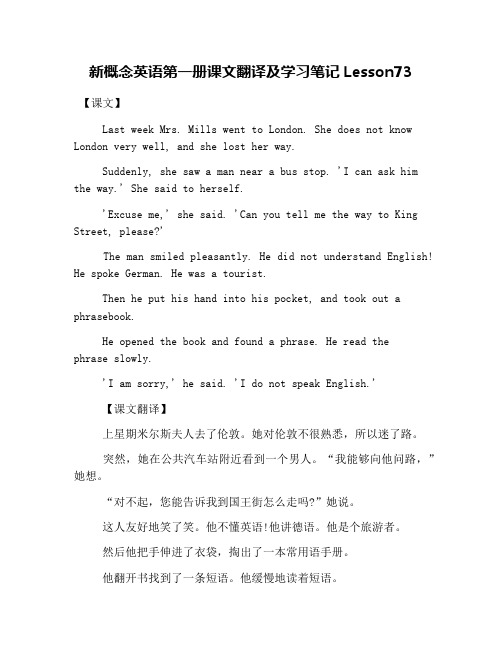
新概念英语第一册课文翻译及学习笔记Lesson73【课文】Last week Mrs. Mills went to London. She does not know London very well, and she lost her way.Suddenly, she saw a man near a bus stop. 'I can ask him the way.' She said to herself.'Excuse me,' she said. 'Can you tell me the way to King Street, please?'The man smiled pleasantly. He did not understand English! He spoke German. He was a tourist.Then he put his hand into his pocket, and took out a phrasebook.He opened the book and found a phrase. He read thephrase slowly.'I am sorry,' he said. 'I do not speak English.'【课文翻译】上星期米尔斯夫人去了伦敦。
她对伦敦不很熟悉,所以迷了路。
突然,她在公共汽车站附近看到一个男人。
“我能够向他问路,”她想。
“对不起,您能告诉我到国王街怎么走吗?”她说。
这人友好地笑了笑。
他不懂英语!他讲德语。
他是个旅游者。
然后他把手伸进了衣袋,掏出了一本常用语手册。
他翻开书找到了一条短语。
他缓慢地读着短语。
“很抱歉,” 他说,“我不会讲英语。
”【生词】week n. 周London n. 伦敦suddenly adv. 突然地bus stop 公共汽车站smile v. 微笑pleasantly adv. 愉快地understand (understood ) v. 懂,明白speak (spoke ) v. 讲,说hand n. 手pocket n. 衣袋phrasebook n. 短语手册,常用语手册phrase n. 短语slowly adv. 缓慢地【知识点讲解】在新概念一的课本里,73课前面有一个小测试,有书的同学能够自己做一下检验一下学到现在的水平。
新概念1第73课
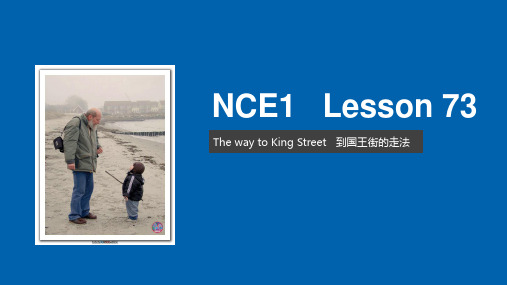
way 道路,方法
on the way to ...在去...的路上 on the way home 在回家的路上 on the way to school 在去学校的路上
ask sb. the way 向某人问路 An old man asked me the way to the supermarket just now.
思考:形容词为什么要变副词? 因为形容词只能修饰主语是人或物.而副词要修饰动作。
happy-----happily pleasant------pleasantly slow-----slowly
形容词变副词变化
quiet slow beautiful
quietly slowly beautifully
London Famous Attractions
(伦敦著名的旅游景点)
The London Bus 伦敦公交
King's Road 国王街
Passage Explain(课文讲解)
Q:Why did the man need a phrasebook?
为什么这位男士需要一本常用语手册?
New words and expressions(生词和短语)
lose
lose v. (使)迷路 ✓ v. 迷失;(使)迷路
lose one's way 迷路 ✓ v. 失去;丧失
He lost his sight in a car accident. 他在一起汽车交通事故中失明了。
Grammar(重点语法)
Key structures(重点句型):
新概念英语第一册第73课精编版
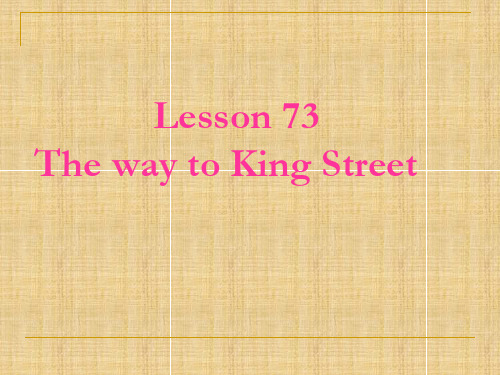
well.
lose one’s way 迷路(丢失了某人的路)。 lose my way, lose our way lose-lost. 这里的and相当于so。不翻成和
动词的过去式总结
一般来说,规则动词 v+ ed played, watched 等 以e结尾的动词, 直接+d telephoned, smiled, arrived 等 不规则动词 find-found, see-saw, speak-spoke, put-put
等 需要记忆
suddenly 既可以放在句首,也可以放在句中或 句末。 see-saw see看见,near 在附近。 near our school
ask sb. sth. 问某人某事。ask-asked 例句:He asked the teacher a question. say-said say to oneself 心中暗想myself,
Where is ......? the way to… 去...的路 这里的pleasantly是个副词(adv),修饰动作
smile。smile-smiled
He did not understand English. 改成肯定句
He understood English. did 是助动词 do/does 的过去式。 He spoke German. 改成 否定句,一般疑问
yourself, himself, herself, itself, ourselves, yourselves, themselves
新概念第一册73课
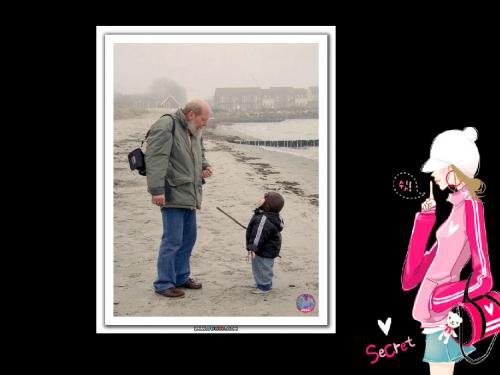
Lesson 73 The way to King Street. Lesson 74 What did they do?
Because he didn’t understand English.
Unit 37
( 7 )understand ( 8 )speak ( 11)phrasebook ( 12)phrase ( 13)slowly ( 9 )hand( 1 )week ( 2 )London( 5 )smiled ( 6 )pleasantly ( 10)pocket ( 3 )suddenly ( 4 )bus stop
suddenly adv.突然地
sudden adj. 突然的,意外的 all of a sudden 突然,冷不防
Suddenly, she saw a man near a bus stop. 突然,她在公共汽车站附近看到一个男人。
smile [smail]微笑
laugh
laugh at
• 形容词来修饰名词
• • • •
I work hard. You sing well. Jane drives carefully. Kevin runs fast.
• 副词来修饰动词
He read the phrase slowly.
He cut himself badly.
Listen and speak English !
找找文中出现的副词,你认识吗?
• • • • well suddenly pleasantly slowly
形容词与副词的变化方式包括以下三类: 形容词词尾加ly 成为副词 1.quiet--- quietly slow--- slowly beautiful---beautifully 2. 形容词与副词同形 例如:fast--- fast hard--- hard 3. 形容词与副词完全不同 例如:good--- well
新概念英语第一册7月73&74课精品课件!
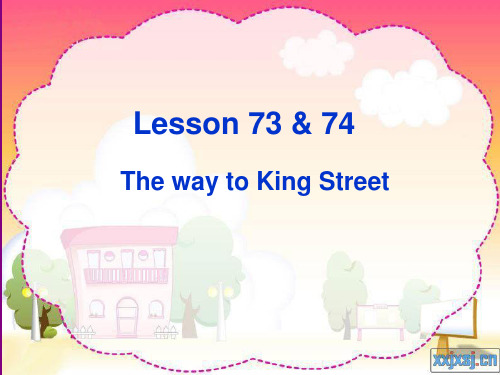
Exercises:
Open your book and look at Part A : try to finish it. Finish the exercises of Part B on Page 152.
1. Recite the dialogue. 2. Finish the related exercise. 3. Learn the new words by heart.
Lesson 74
• 1 hurriedly ad.匆忙地: hurry:adj. 短语: in a hurry:She goes to work in a hurry. • 2 cut v.割,切 过去分词:cut-cut • 3 thirstily ['θə:stili] ad.口渴地 • thirsty:adj. : I am very thirsty. • So I drank the water thirstily. • 4 go [gəu] v.走 : Don't let go. 别放弃! • Let go!放手! • 5 greet [gri:t] v.问候,找招呼 • greet sb.:跟某人打招呼。 • She greet me warmly.
• He , open the book, find a phrase • He, read it, slow • "I, sorry , I, not speak English"
Listen to the tape!
• Listen and repeat!
• 副词的用法: • 作用:副词是通过修身动词或者形容词来进一步强调 该动作或形容词的程度。 • 位置:一般来说,副词放在动词之后形容词之前。 (形前动后) 变换方法: 一,直接在形容词后加ly。 quick:quickly 二,以辅音字母加y结尾的形容词后边y为i加ly: hungry-hungrily。 三,有些词形容词和副词形式一样: late, fast
新概念英语第一册第73课.ppt
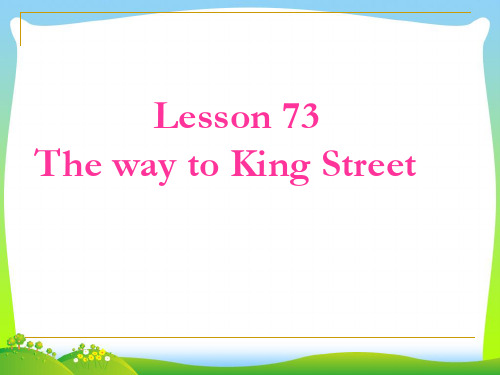
phrasebook /freɪz/ 短语手册
pocketˈ /pɒkɪt/ 口袋
speak /spiːk/ 说
watch the video and answer these questions.
Where did Mrs. Mill go last week? Why did the man need a phrasebook? What’s the man’s job(工作)? role playing
put-put, take-took put… into… 把…放进…中去 take.. out... 把... 拿出来。 slowly 副词(adv) 修饰动词 read , slow- slowly,以y结尾的, happy-happily
He read the book slow.
know-knew 例句:I know him very well. I don’t know the city very
well.
lose one’s way 迷路(丢失了某人的路)。 lose my way, lose our way lose-lost. 这里的and相当于so。不翻成和
suddenly 既可以放在句首,也可以放在句中或 句末。 see-saw see看见,near 在附近。 near our school
Did he speak German? spoke 变成了原形
speak-spoke speak:说某种语言speak English, German 同某人通电话speak to sb. tell:告诉、告知。tell sb. sth. say: 说话(一件事) say sth. / She said, ‘…’ She ___ me she was 18 years old. She said ‘ Thank you very much.’ She wanted to ___ to me.
新概念第一册Lesson-73-74完整版
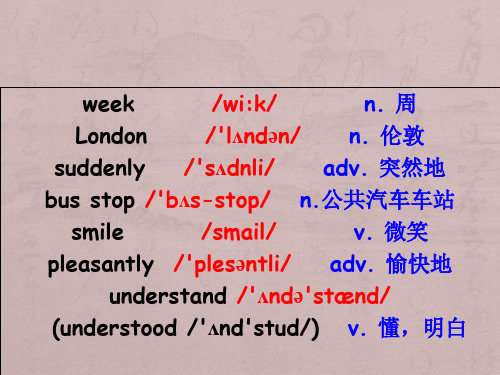
她愉快地笑了。
smile a…smile 微微一笑
The man smiled pleasantly. 这人友好地笑了笑。
★ understand v. 懂,明白 /'ʌndə'stæ nd/(understood )
He opened the book and found a phrase. He read the phrase slowly. 'I am sorry,' he said. 'I do not speak English.'
1.What did Mrs. Mills do last week? She went to London. 2.What happened to her? She lost her way. 3.Why did the man need a
时态用法动词形式肯定句否定句一般疑问句及其回答特殊疑问句及其回答一般现在时一般经常习惯真理原形时态用法动词形式肯定句否定句一般疑问句及其回答特殊疑问句及其回答一般现在时一般经常习惯真理原形三单dodoesidohedoesidontdohedoesntdo
week
/wi:k/
n. 周
London
/'lʌndən/ n. 伦敦
this week, last week, (前面不能加介词)
the week before last 上上周 the week after next 下下周
★ London /'lʌndən/ n. 伦敦 英国的首都
★ suddenly
/'sʌdnli/ adv. 突然地 既可以放在句首, 也可以放在句中或句末。
新概念第一册 Lesson73
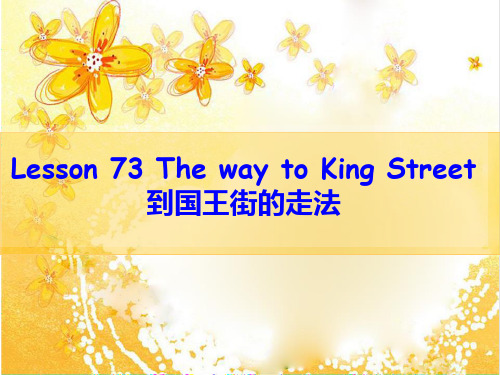
形容词、副词
• 形容词是什么?副词又是什么?我们用一个句子 来说明。She is a good student, and she works hard. 本句中,good 就是形容词,而hard 则是副词 • 形容词用来修饰名词或代词, 表示人或事物的性质 , 状态,和特征。 • 副词是一种用来修饰动词,形容词,副词或全句的词 ,说明时间,地点,程度,方式等概念。
选择正确的词填空
1. You are_____beautiful.(副词,非常/十分) 2. Please drive _____(slow, slowly). 3. He can speak English__________(very good, very well) 4. He ran out of room _______(hurried, hurriedly). 5. He greeted me________(warm, warmly) 6. He gave me a ______(warm, warmly)welcome.
slowly lazily badly carefully suddenly
• 1.Lily doesn't know Hong Kong very well, and she____________last month. • A, lost the way B, losing her way C, lost her way D, lose her way • 2.You'd better drive_________at night. • A, slow B, careful C, slowly D, care • 3.Excuse me, can you tell me the way__the Big Ben? • A, for B, to C, of D, at • 4.A: Where____you yesterday afternoon? B: I______in the library. • A, were; was B, was; were C, were; was D, was; was • 5."How silly of me!" the man said______. • A, to himself B, with him C, for himself D, by him
- 1、下载文档前请自行甄别文档内容的完整性,平台不提供额外的编辑、内容补充、找答案等附加服务。
- 2、"仅部分预览"的文档,不可在线预览部分如存在完整性等问题,可反馈申请退款(可完整预览的文档不适用该条件!)。
- 3、如文档侵犯您的权益,请联系客服反馈,我们会尽快为您处理(人工客服工作时间:9:00-18:30)。
homework
1.听录音并跟读, 2.每个单词5遍,包括不规则动词
课文准备默写 3. 课课练
动词的过去式总结
一般来说,规则动词 v+ ed played, watched 等 以e结尾的动词, 直接+d telephoned, smiled, arrived 等 不规则动词 find-found, see-saw, speak-spoke, put-put
等 需要记忆
phrasebook /freɪz/ 短语手册
pocketˈ /pɒkɪt/ 口袋
speak /spiːk/ 说
watch the video and answer these questions.
Where did Mrs. Mill go last week? Why did the man need a phrasebook? What’s the man’s job(工作)? role playing
listen to the tape again
Last week Mrs. Mills went to London. She does not know London very well, and she lost her way.
Suddenly, she saw a man near a bus stop. 'I can ask him the way.' she sai way to King Street
Do you know the way to King Street?
Last week, Mrs. Mills wanted to go to King street, she didn’t know the way, either. Let’s see what happened?
句 He didn’t(did not ) speak English.
Did he speak German? spoke 变成了原形
speak-spoke speak:说某种语言speak English, German 同某人通电话speak to sb. tell:告诉、告知。tell sb. sth. say: 说话(一件事) say sth. / She said, ‘…’ She ___ me she was 18 years old. She said ‘ Thank you very much.’ She wanted to ___ to me.
know-knew 例句:I know him very well. I don’t know the city very
well.
lose one’s way 迷路(丢失了某人的路)。 lose my way, lose our way lose-lost. 这里的and相当于so。不翻成和
Then he put his hand into his pocket, and took out a phrasebook.
He opened the book and found a phrase. He read the phrase slowly. 'I am sorry,' he said. 'I do not speak English.'
put-put, take-took put… into… 把…放进…中去 take.. out... 把... 拿出来。 slowly 副词(adv) 修饰动词 read , slow- slowly,以y结尾的, happy-happily
He read the book slow.
suddenly 既可以放在句首,也可以放在句中或 句末。 see-saw see看见,near 在附近。 near our school
ask sb. sth. 问某人某事。ask-asked 例句:He asked the teacher a question. say-said say to oneself 心中暗想myself,
'Excuse me,' she said. 'Can you tell me the way to King Street, please?'
The man smiled pleasantly. He did not understand English! He spoke German. He was a tourist.
lose her way 迷路了
suddenly /sʌd(ə)nli/ 突然
bus stop 公共汽车站
tell me the way 告诉我路
smile /smaɪl/ 微笑 laugh pleasantly 愉快地
understand /ʌndə(r)ˈstænd/ - understood 理解
Where is ......? the way to… 去...的路 这里的pleasantly是个副词(adv),修饰动作
smile。smile-smiled
He did not understand English. 改成肯定句
He understood English. did 是助动词 do/does 的过去式。 He spoke German. 改成 否定句,一般疑问
yourself, himself, herself, itself, ourselves, yourselves, themselves
tell sb the way to 告诉某人去....的路 tell-told the way to school/ hospital
How can I get to ......?
text in detail
last week 上周 有last 出现,用过去式 He telephones me last night last year 去年 last night go-went 举例:go to school, go to Beijing, go to
the museum. 注意:go home, go there(副前不用介) know sth./sb. very well 对什么东西或什么人很熟悉。
